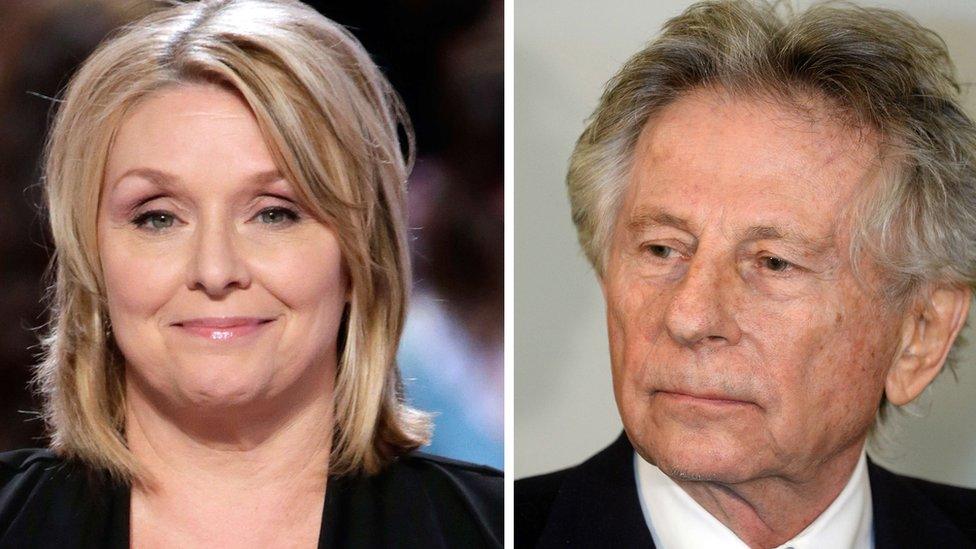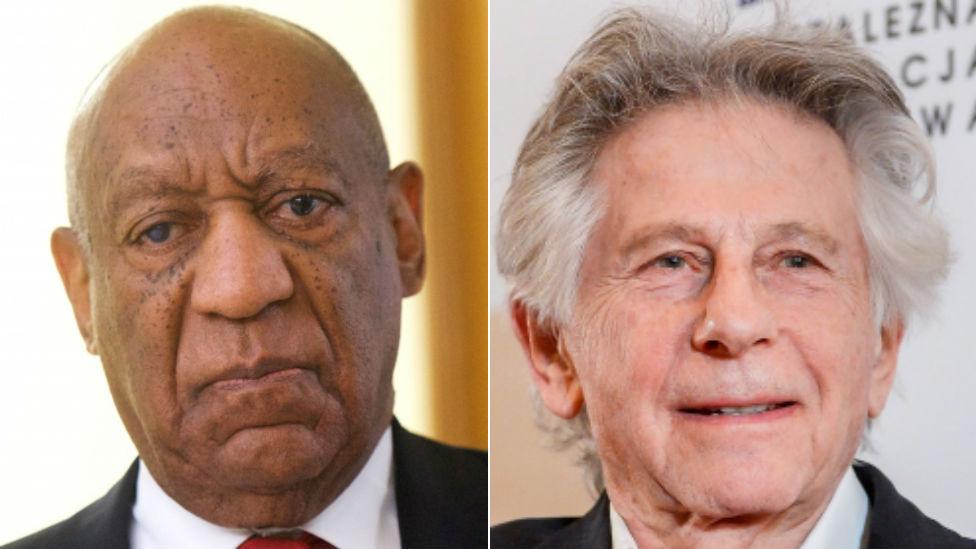France's César Academy board quits en masse amid Polanski row
- Published

Polanski topped the nominations for this year's César awards (file pic 2014)
The entire board of the César Academy, which distributes France's equivalent of the Oscars, has resigned amid a wave of criticism of its nomination for 12 awards for a film by Roman Polanski.
The decision to honour Polanski's An Officer and a Spy has angered feminist groups and led to calls for a boycott.
The Polish-French director has been wanted in the US for the statutory rape of a 13-year-old girl since the 1970s.
Hundreds of actors, producers and directors have also called for reform.
In an open letter this week, they denounced "dysfunction" at the César Academy and opacity in its management.
The César Academy's decision to step down en masse came as a shock ahead of the glittering 45th awards ceremony in Paris, which is to be held on 28 February.
In a statement on Thursday night, the academy said the board had "unanimously decided to resign" to "honour those men and women who made cinema happen in 2019, to find calm and ensure that the festival of film remains just that, a festival".
"This collective decision will allow complete renewal of the board," it added.
A general meeting is set to be held after this month's ceremony to elect a new board, which will look at implementing reforms and modernising the institution.
Culture Minister Franck Riester said the César Academy must operate democratically, in the spirit of "openness, transparency, parity and diversity".
What's the background?
The César Academy has faced controversy in recent months.
Many called for a boycott when Polanski's film An Officer and a Spy, or J'accuse in French, received 12 award nominations. The Polish-French director fled the US after pleading guilty to unlawful sex with a minor in the 1970s, and has since faced other accusations of sexual assault.
Samantha Geimar: Consequences of rape were awful
"We're in shock that Roman Polanski, who's accused by several women of paedophile rape crimes, is yet again hailed by French cinema," said Céline Piques, spokeswoman for French feminist organisation Osez le Féminisme (Dare to be Feminist).
France's equality minister, Marlène Schiappa, also condemned the decision to nominate Polanski's film.
While praising the academy's efforts to recognise France's MeToo movement, Ms Schiappa said she found it "impossible that a hall gets up and applauds the film of a man accused of rape several times".
But the Césars defended the nominations, arguing that the body "should not take moral positions" in giving awards.
Polanski himself told Paris Match in December that he had tried to distance himself from the calls for a boycott of his film. "For years people have tried to make me out as a monster., external I'm used to the slander and I've grown a thick skin, which is as hard as a shell," he said.
I made a mistake in 1977 and it's my family who are paying the price more than 50 years later

How the Césars are nominated
The academy, which numbers 4,680 cinema professionals, has also been criticised for being out of touch and dominated by older men. Only 35% of the members are women and to be part of it you have to have had two sponsors and taken part in three films in five years.
All members who have paid their subscriptions (4,313 this year) hold a secret online vote to decide which films should be nominated and then ultimately which should win the awards. They are divided into categories including actors, directors and technicians.
Alain Terzian, the academy's president since 2003, was fêted for his films in the 1980s and 90s but he has come in for criticism in recent months.
In an open letter this week, hundreds of film professionals, including actors and directors, called for "profound reform" at the academy.
The signatories, who included major figures in French cinema such as Bertrand Tavernier, Bérénice Bejo, Leïla Bekhti and Michel Hazanavicius, complained of a lack of democracy in the institution and said the founding statutes of the Césars had not changed "for a very long time".
In response, the academy's board said it would ask for a mediator to be appointed by a culture ministry agency to oversee reforms of its statutes and governance.
It is not the first time the Césars have faced controversy. In 2017, Polanski was picked to head the award's jury, but stepped down after the move sparked outrage.
Despite the controversy surrounding the film, J'accuse was a box office hit in France at the end of 2019 and has done well in several other European countries.
Polanski has French and Polish citizenship, and has evaded various extradition attempts by US authorities.
France - where he lives - does not extradite its own citizens. A Polish court also rejected a US request when he was filming in Krakow in 2015.
- Published30 October 2015

- Published7 November 2019

- Published1 March 2020

- Published3 May 2018
